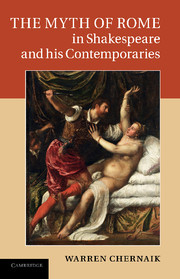Book contents
- Frontmatter
- Contents
- Acknowledgements
- Introduction: a Roman thought
- 1 Roman historians and the myth of Rome
- 2 The wronged Lucretia and the early republic
- 3 Self-inflicted wounds
- 4 ‘Like a Colossus’: Julius Caesar
- 5 Ben Jonson's Rome
- 6 O'erflowing the measure: Antony and Cleopatra
- 7 The city and the battlefield: Coriolanus
- 8 Tyranny and empire
- 9 Ancient Britons and Romans
- Postscript: Shakespeare and the republican tradition
- Notes
- Bibliography
- Index
Introduction: a Roman thought
Published online by Cambridge University Press: 29 March 2011
- Frontmatter
- Contents
- Acknowledgements
- Introduction: a Roman thought
- 1 Roman historians and the myth of Rome
- 2 The wronged Lucretia and the early republic
- 3 Self-inflicted wounds
- 4 ‘Like a Colossus’: Julius Caesar
- 5 Ben Jonson's Rome
- 6 O'erflowing the measure: Antony and Cleopatra
- 7 The city and the battlefield: Coriolanus
- 8 Tyranny and empire
- 9 Ancient Britons and Romans
- Postscript: Shakespeare and the republican tradition
- Notes
- Bibliography
- Index
Summary
When Cleopatra says of Antony, ‘a Roman thought hath struck him’ (AC, 1.2.87) or when Horatio says to Hamlet, ‘I am more an antique Roman than a Dane’ (Ham, 5.2.325), Shakespeare suggests that there are certain values that are characteristically Roman, but not geographically or temporally limited to a particular place. As G. K. Hunter has said, Cleopatra's ‘Roman’, by a shorthand readily recognizable by Shakespeare's audience, means ‘soldierly, severe, self-controlled, disciplined’, virtues toward which Cleopatra, as hedonist, feels distinctly ambivalent. Horatio's ‘antique Roman’, by a similar shorthand, implies an advocacy of suicide as preferable to dishonour or a life of ‘bestial oblivion’ (Ham, 4.4.39), a view sharply at variance with Christian doctrine. Cleopatra alludes to similar notions when she expresses a desire to die by suicide ‘after the high Roman fashion’, acting in accordance with ‘what's brave, what's noble’ (AC, 4.15.90–1), transforming herself into a Roman by her death. Antony, one of many Roman heroes in Shakespeare to die by his own hand, proclaims his constancy to such values in his dying words:
… and do not basely die,
Nor cowardly put off my helmet to
My countryman: a Roman by a Roman
Valiantly vanquished.
(4.15.57–60)In many of these passages, there is an assumption that most people fail to live up to this ideal of conduct, that relatively few Romans are worthy of the name.
- Type
- Chapter
- Information
- Publisher: Cambridge University PressPrint publication year: 2011



